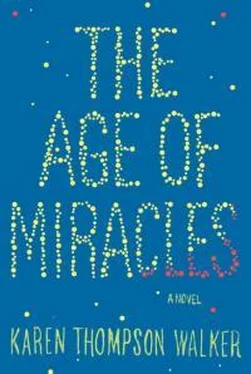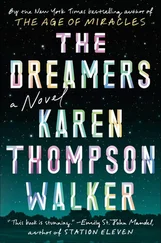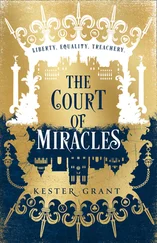But the events of this day begin with the golden retriever. Like the animals in our neighborhood, this dog was spooked by the solar storm, this dog especially so. He leaped over his backyard fence and went running.
He sprinted for ten blocks, passed driveways, tree stumps, the plastic approximations of lawns. This was a planned community, still new at the time of the slowing, and bent on appearing as little changed as possible. The slopes were naked of trees, of course, but the houses now offered distant ocean views, unobstructed for miles. Finally, this golden retriever scuttled up a hill and burst onto a piece of property that lay just beyond the development, a slice of parched land on which my grandfather’s house stood. By the time the dog’s owners caught up to him, he was digging at a piece of metal that was half buried in the dirt behind the woodpile. It was a rusty trapdoor pressed flat into the earth.
The owners of the dog soon called the police.
Some say that love is the sweetest feeling, the purest form of joy, but that isn’t right. It’s not love—it’s relief.
I remember the exact pitch of my mother’s voice as she called up to me from downstairs. “There he is,” she said. “There he is.”
Our whole future was rewritten by the brief sound of my father’s engine dying in the driveway.
“Sorry,” he said, shaking his phone in the air. “I tried to call.”
Only later did we discover that the solar storm had wiped out the cell phone satellites. A million desperate calls flew into space that day but landed nowhere.
“Where have you been?” asked my mother.
But I didn’t care anymore. He was home. He was here. I forgave him in an instant.
I didn’t notice right away the look of trouble on my father’s face. I should have known by then that it’s never the disasters you see coming that finally come to pass; it’s the ones you don’t expect at all. There was a reason my father was late that day. He’d been to my grandfather’s house.
Behind my grandfather’s woodpile, where wildflowers once grew, there lay an ancient trapdoor, flat and rusted. This was the entrance to the underground shelter he had built six decades earlier in case of nuclear war.
I had not known about the shelter. My father remembered it from his youth but could barely recall its location in the yard. In fact, he would later say that he had assumed the shelter had collapsed years ago. But in the months before he disappeared, we now discovered, my grandfather had secretly repurposed the space for the fears of this new age.
It was ten feet by twelve, the walls lined with thirteen inches of cement. Inside were cases of bottled water, rows of canned food, two shotguns, and a hand-crank radio. There were four sleeping bags and four cots, one for each of us. There were several boxes of my favorite granola bars. Much of what was missing from his house was also found in the shelter. In one corner stood several boxes of photographs and valuables, shoe boxes full of the gold bars I’d seen him packing in his dining room. A two-year calendar hung on one wall. This was a cavity designed for waiting out the crumbling of society and whatever else came next. It was designed not only for him but for us, for my parents and for me. I guess he wasn’t so eager after all to escape the confines of this life.
Spilled across the floor were the contents of my grandfather’s final bundle: a deck of cards, an old edition of Monopoly, a checkerboard and checkers. All the pieces were scattered on the cement. On the floor of the shelter, a wooden ladder lay at an unnatural angle. According to the police report, it was here that my grandfather’s body was found.
He was once a hardy man, but the first thing I thought when I heard the news was how delicate his skin had become, how easily and often it released his blood.
Later, I would spend a great deal of time obsessing about the rules of cause and effect, how the tipping of that ladder was one in a long chain of events. What if the floor of the shelter had been lined with carpet instead of cement? What if the ladder’s manufacturer had coated the feet with rubber for better grip? Maybe such a ladder would not have slid so easily across the floor. If the Soviets had decided not to ship nuclear missiles to Cuba in 1962, my grandfather never would have built the shelter; had the earth’s rotation remained in a steady state, he never would have reclaimed it. I used to lie awake at night tracing the thousand other things that might have prevented my grandfather’s death, but from the moment the ladder wobbled, the possibilities narrowed: His head struck the cement, the blood of his veins poured into his brain, his heart quit beating, and he left this earth for good.
It was later estimated that he died on the same day he disappeared, two months earlier, my birthday. At the time of his fall, he was wearing his gray slacks, his leather shoes, and his corduroy sport coat. He was dressed for our dinner. The police surmised that he had climbed down into the shelter less than an hour before we arrived that night, and that he likely only intended to carry one last load of supplies—all the board games he knew I liked best—to the shelter before joining us for dinner. In his coat pocket, they found a pale blue envelope with my name written in my grandfather’s shaky letters on the front. Inside was a birthday card and a twenty-dollar bill. There was a brief handwritten note: Happy Birthday, Julia. God bless .
It never used to rain where we lived, but it rained on the day we buried my grandfather. We held the service in the cool safety of the dark. My father was quieter at the cemetery than I had ever seen him. My mother cried softly behind me. The black casket gleamed beneath the floodlights as raindrops rolled down the sides. I could not believe he was in there, my grandfather, lying dead. I could still hear the sound of his voice in my ears. I could still see his face. I’d never been to a funeral before.
Soon the dirt turned to mud, and the rain turned to sleet. Somewhere on the other side of the planet, the sun was shining, and the people there were hiding from the light. I remember shivering in my parka and wondering about the difference between coincidence and fate.
* * *
I recovered quickly from my sunburns, but Seth was sick for weeks. The skin on his arms bubbled and sloughed. A succession of fevers washed over his body. The doctors couldn’t say if it was from the sunburn or from something else. He stayed home from school for two weeks. I sat with him in the afternoons, but he spoke little and slept often. The old hours opened up again like scars—I went back to spending my lunches in the library, anxious and alone.
Seth eventually revived, but I worried even then that some damage had already been done. Some things that happen during youth, you carry with you into later life, and certain experts were already predicting an approaching tidal wave of cancers.
April dissolved quickly into May, and May was the month when the earthquakes began. They were mild back then but frequent, an almost daily rumbling. That same month, we built a second greenhouse in the backyard, and we sunproofed our windows. My mother bought padlocks for all the doors in the house. My father bought a gun.
Seven sunsets later, it was June.
The last day of school that year was the quietest last day in memory. We failed to summon the usual glee. It was partly the darkness that muted us, the slim sickle moon, but it was something else, too: a new sense of time, I guess, how swiftly it slides away. There was a feeling on that last day of school, as we zipped up our backpacks and stacked our books in the book room, that we might never return to those halls. September loomed just three months away, but we had stopped predicting the future. The signing of yearbooks was taken more seriously that year. Nostalgia flowed from every pen. I hadn’t spoken to Hanna in months, but she insisted on signing the page in my book near her picture, snapped at a time when we were still friends. I never saw Hanna again. She and her family drove back to Utah that summer to wait for whatever would come.
Читать дальше












